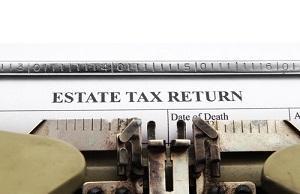What Is the Estate Tax?
 Although he was not the first to make such an observation, Benjamin Franklin wrote to a friend in 1789, "Our new Constitution is now established, and has an appearance that promises permanency; but in this world, nothing can be said to be certain except death and taxes." The tongue-in-cheek quip was not really a commentary on death or taxes, but on his hope for a new country in its infancy. What his contemporaries may not have predicted is that some 240 years later, there may actually be a type of death tax. While "death tax" is not exactly an accurate description, it is possible for the government to claim a portion of a recently deceased person’s estate.
Although he was not the first to make such an observation, Benjamin Franklin wrote to a friend in 1789, "Our new Constitution is now established, and has an appearance that promises permanency; but in this world, nothing can be said to be certain except death and taxes." The tongue-in-cheek quip was not really a commentary on death or taxes, but on his hope for a new country in its infancy. What his contemporaries may not have predicted is that some 240 years later, there may actually be a type of death tax. While "death tax" is not exactly an accurate description, it is possible for the government to claim a portion of a recently deceased person’s estate.
Estate Tax Defined
According to the Internal Revenue Service, the federal estate tax is a formal tax on your right to transfer your assets and property upon your death. The estate tax applies to those the portion of an estate that exceeds a minimum value standard. The standard is increased every year to account for inflation, and, in 2016, that minimum is $5.45 million per person. Those with an estate valued at more than that amount could be subject to the estate tax.
Estate Tax Rate
The estate tax rate and minimum estate values have been a hot topic in this year’s presidential election, with one candidate looking to reduce the exempt portion of a person’s estate and the other looking to eliminate the estate tax altogether. As it currently stands, the estate tax only applies to the portion of a person’s estate above the minimum value, and the statutory estate tax rate is 40 percent.
The numbers often cited in political debates, however, may seem a bit misleading. For example, assume a person dies with an estate valued at $6.5 million. That is above the threshold for the estate tax to apply, so the federal government would claim 40 percent of $6.5 million, or $2.6 million, right? Wrong. Only the portion above the exemption amount of $5.45 million is taxable, so the estate tax would be 40 percent of $1.05 million, or $420,000. Despite the application of a "40 percent" estate tax, the effective tax rate would be about 6 percent of the total estate. The effective tax rate, of course, would increase with the size of the taxable estate.
Estate and Tax Planning
There are several ways that you may be able to reduce your estate tax liability or eliminate it altogether, but doing so is often complicated. An experienced Lombard estate planning attorney can help you explore your available options and will work with you in protecting your assets. Contact A. Traub & Associates for a confidential consultation today.
Sources:
http://www.aproundtable.org/tps2.cfm?ID=879&issuecode=history
https://www.irs.gov/businesses/small-businesses-self-employed/estate-tax
http://www.cbpp.org/research/federal-tax/ten-facts-you-should-know-about-the-federal-estate-tax
http://www.bankrate.com/finance/taxes/estate-tax-and-gift-tax-amounts.aspx












